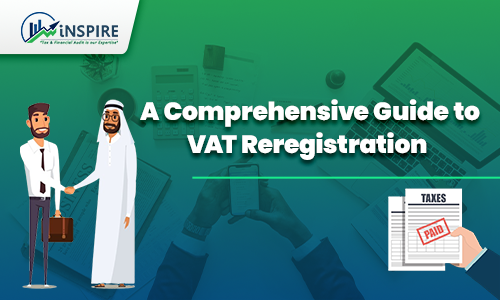
A Comprehensive Guide to VAT Reregistration: Navigating Changes in the UAE Tax Landscape
Value Added Tax (VAT) registration is a crucial obligation for businesses operating in the United Arab Emirates (UAE) to comply with the country's tax laws and regulations. However, there are instances where businesses may need to reregister for VAT due to changes in their business structure, ownership, or other relevant factors. In this guide, we'll explore the key aspects of VAT reregistration in the UAE and provide valuable insights to help businesses navigate this process effectively.
Understanding VAT Reregistration:
VAT reregistration refers to the process of updating or amending an existing VAT registration due to changes in a business's circumstances. These changes may include:
Change in Business Structure: If a business undergoes a change in legal structure, such as conversion from a sole proprietorship to a partnership or incorporation of a company, it may need to reregister for VAT.
Change in Ownership: In cases where there is a change in ownership or transfer of business ownership, the new owner may need to reregister for VAT to ensure compliance with tax obligations.
Change in Business Activities: If there is a significant change in the nature of the business activities conducted, such as expansion into new product lines or services, it may trigger the need for VAT reregistration.
Voluntary Reregistration: Businesses may also choose to voluntarily reregister for VAT if they believe it is in their best interest or if they anticipate exceeding the mandatory registration threshold in the future.
Key Steps in VAT Reregistration:
Review Eligibility Criteria: Before initiating the reregistration process, businesses should review the eligibility criteria to ensure they meet the requirements for VAT registration as per the UAE tax laws.
Update Business Information: Businesses must update their business information, including legal name, trade license details, contact information, and bank account details, as part of the reregistration process.
Submit Application: Once the necessary updates are made, businesses can submit the VAT reregistration application through the Federal Tax Authority (FTA) portal or seek assistance from authorized tax agents.
Provide Supporting Documents: Along with the reregistration application, businesses may be required to provide supporting documents such as updated trade license, memorandum of association, ownership documents, and any other relevant documentation.
Await Approval: After submitting the application, businesses must await approval from the FTA. The processing time may vary depending on the complexity of the application and other factors.
Update Compliance Processes: Upon receiving approval for VAT reregistration, businesses should update their compliance processes, accounting systems, invoicing procedures, and tax returns filing accordingly.
Maintain Records: It is essential for businesses to maintain accurate records of VAT transactions, registrations, amendments, and correspondence with tax authorities to ensure transparency and compliance with regulatory requirements.
Benefits of VAT Reregistration:
Compliance with Tax Laws: Reregistering for VAT ensures that businesses remain compliant with UAE tax laws and regulations, avoiding potential penalties and sanctions.
Smooth Transition: Updating VAT registration proactively allows businesses to navigate changes in their circumstances smoothly and without disruption to their operations.
Access to Input Tax Credit: Reregistered businesses can continue to claim input tax credits on eligible expenses incurred for business purposes, helping to reduce overall tax liabilities.
Legal Protection: Maintaining accurate and up-to-date VAT registration provides legal protection and clarity on tax obligations, rights, and responsibilities.
Conclusion:
VAT reregistration is a critical process for businesses in the UAE to ensure compliance with tax laws and regulations. By understanding the key steps involved and proactively updating their VAT registration as needed, businesses can navigate changes in their circumstances smoothly and continue to operate with confidence in the dynamic tax landscape of the UAE. Seeking guidance from experienced tax advisors or consultants can further streamline the reregistration process and ensure adherence to regulatory requirements.











